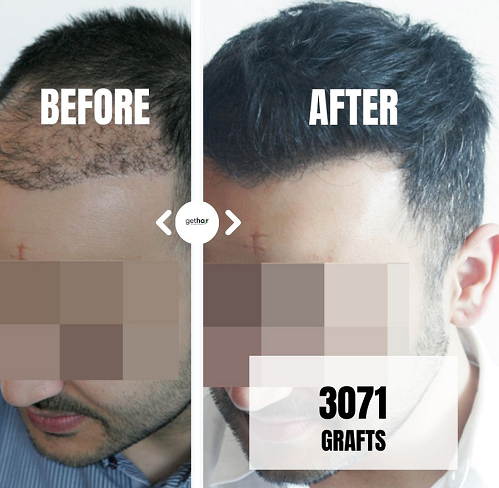Unlock a new chapter in confidence with hair transplants. Explore their profound impact on self-esteem, well-being, and mental health recovery.

How Hair Transplants Can Boost Self-Esteem & Well-being
The Intertwined Path of Hair Loss and Mental Health
Hair loss isn’t solely a physical ordeal; it inevitably intertwines with mental health, leading to a nuanced emotional journey for many individuals. Imagine the stress of watching your hair thin or disappear – it can feel like losing a piece of your identity. This sense of loss extends beyond the scalp, often touching the very fabric of our self-esteem and emotional well-being.
The connection between hair loss and mental health is robust, underscored by numerous studies linking alopecia to anxiety and depression. The despair stemming from hair loss can result in a reduced sense of personal control, sparking feelings of frustration and helplessness. In this silent struggle, a person’s hair is not just a physical attribute but a part of their self-image, influencing how they perceive themselves and, in turn, how they believe they are perceived by others.
Grasping the Psychological Impact of Hair Loss
Grasping the psychological impact of hair loss is essential for understanding why restoring hair can be so transformative. For many, a receding hairline or a patchy scalp is not just an aesthetic issue. It’s a source of ongoing stress and anxiety. Hair loss has been linked to a host of mental health challenges, including diminished self-confidence, social withdrawal, and even depression.
Picture looking in the mirror and not recognizing the reflection staring back; that’s a daily reality for those suffering from hair loss. It’s not just about vanity but about identity and self-perception. The emotional toll can be heavy, especially in a society that often equates beauty and hair with youth and health.
Women may feel pressured to conceal their hair loss due to societal norms, further exacerbating their emotional distress. Meanwhile, men may feel they are losing their vigor and youthful appeal. In both cases, the psychological strain is real, deeply felt, and often underestimated by those who have never faced such issues.
By understanding the significant emotional weight borne by individuals with hair loss, we can appreciate the profound impact a hair transplant may have in restoring not just hair but also psychological fortitude and joy in life.

How Hair Restoration Can Pave Way to Mental Well-Being
Hair restoration can be a beacon of hope, marking a pivotal point on the road to mental well-being. Deciding to undergo a hair transplant is often about reclaiming not just a fuller head of hair but also a lost sense of self. It’s akin to taking control of the steering wheel on your life’s journey after feeling directionless.
The power of such a procedure extends beyond mere aesthetics. Patients who undergo hair transplants report not only improvements in their appearance but also in their overall mental health. It’s a catalyst for an attitude shift, where anxieties related to appearance wane and a more positive mood takes their place. The impact is often mirrored in their demeanor, signaling a reawakening of sorts.
Consider hair transplants as more than cosmetic surgery; it is an investment in personal well-being. It’s not uncommon for patients to note a decrease in social anxieties and an uptick in general life satisfaction post-transplant. Such therapeutic benefits underscore the deep interconnectedness between physical appearance and mental health, with hair restoration acting as a conduit for psychological healing and upliftment.
Realizing Renewed Self-Esteem Through Hair Transplants
A successful hair transplant can be a transformative experience, often leading to a profound renewal of self-esteem. Imagine the surge of confidence that takes hold when you no longer have to worry about concealing bald spots or styling your hair to hide thinning areas. That’s the relief and joy that many experience following a hair restoration procedure.
Renewed self-esteem comes not just from the satisfaction with one’s appearance but also from the sense of empowerment after taking a proactive step to address hair loss. The aesthetic changes can be significant, but it’s the internal metamorphosis that truly alters one’s life narrative. People who were once hesitant to engage in certain activities or social situations often find themselves eager to step out and be seen.
The emotional upswing after such a procedure is backed by patient testimonials and psychological studies. These chronicle increased happiness and self-assuredness alongside the regrowth of hair, illustrating the symbiotic relationship between physical transformation and psychological resurgence. Embracing their new image, individuals begin to engage with the world with a fresh perspective and an uplifted spirit.
Embarking on a Journey Away from Social Anxiety and Depression
Embarking on a journey away from social anxiety and depression is often an incredible side effect of hair transplants, which can proffer unexpected psychological relief. For individuals who’ve receded into their own shells due to hair loss, the procedure can represent a turning point. With each new strand, there’s a gradual stepping away from the shadows of social apprehension and a stepping into the light of interaction and engagement.
Hair transplants do more than fill in balding patches; they help in stitching up the worn fabric of self-esteem. As confidence blooms, the fear of judgment and scrutiny that once stifled social interaction starts to dissipate. The resulting decrease in anxiety and depression comes as individuals feel less defined by their physical imperfection and more equipped to face the world on their own terms.
The positive psychological outcomes of this journey are not just wishful thinking. They are supported by empirical evidence, as studies suggest that post-transplant, many individuals report diminished symptoms of social anxiety and a better quality of life. The ability to mingle without the nagging self-consciousness marks the beginning of a more vibrant social existence, free from the bonds of previous insecurities.
The Ripple Effect of Hair Transplants on Daily Life
The ripple effect of hair transplants touches every aspect of daily life, often in ways that recipients never anticipated. It catalyzes a seemingly endless cascade of positive changes, starting from the first glimpses of regrowth. This new lease on hair brings with it the ability to participate in activities that were once avoided due to self-consciousness about appearance.
As confidence surges, so does the motivation to engage with life more fully, whether that’s pursuing career advancements or embracing outdoor activities that were once shunned for fear of exposing hair loss. There’s a newfound vigor that accompanies the physical changes, and it often translates into an increased willingness to experiment with new hairstyles or fashion choices, adding a refreshing verve to personal expression.
Further still, this revived sense of self can lead to healthier lifestyle choices. Knowing that one looks good can foster a desire to feel good too, driving better dietary habits, regular exercise, and overall well-being. This comprehensive impact on daily life illustrates the far-reaching benefits of hair restoration, which extend far beyond the mirror. Each of these changes contributes to a person’s sense of autonomy and their capacity to live life without the constraints that hair loss can impose.

Energized Living – The Surge in Vitality and Activity
The transformative journey of hair transplants often catalyzes an unexpected surge in vitality and activity. It’s as if the new hair acts as a conduit for energy, propelling individuals to take on life with a renewed sense of gusto and enthusiasm. No longer weighed down by the insecurities tied to their appearance, they find themselves more inclined to say yes to life’s adventures and opportunities.
This newfound energy manifests in various facets of life, from a spirited approach to one’s career to an eagerness to engage in physical activities that once seemed daunting. The gym, social clubs, and outdoor adventures become less intimidating and more appealing. It’s a domino effect of positivity – as one area of life improves, others follow suit, like a tightly knit tapestry of well-being, each thread reinforcing the others.
Witnessing the physical evidence of regrowth can also be a powerful motivator, encouraging maintenance of this renewed lifestyle. Regular exercise and an active social calendar contribute to overall health, further enhancing the quality of the transplanted hair. It’s a holistic upswing, with each new day presenting a chance to live more fully, powered by the confidence that comes from feeling good about one’s hair and image.

The Revival of Personal Relationships Post-transplant
The revival of personal relationships post-transplant is another remarkable chapter in the story of hair restoration. It’s impressive to see how a change in one’s self-image can renew the warmth and closeness in their relationships. Friends and family often notice the difference not just in terms of appearance but in the individual’s demeanor and outlook on life.
Relationships that may have suffered due to the individual’s withdrawal or lack of confidence can begin to flourish anew. With barriers lowered, communication improves, leading to deeper connections and a more fulfilling social life. Compliments from loved ones about the improved appearance can boost morale and further cement the positive outcomes of the transplant.
Intimate relationships especially benefit, as increased self-esteem can rekindle feelings of attractiveness and desire. This revitalization can spill over into greater intimacy and partnership satisfaction. The journey through hair restoration becomes more than an individual pursuit; it’s a shared experience of rediscovery and reconnection with the people who matter most.
Conclusion
In conclusion, hair transplants offer more than just a physical transformation; they can be a powerful catalyst for enhancing mental health and self-esteem. By restoring hair, individuals reclaim not only their appearance but also their confidence, leading to significant improvements in their overall well-being. The positive ripple effect of a successful transplant extends into daily life, fostering greater social engagement, vitality, and personal relationships. Ultimately, hair restoration provides a chance to renew not just your hair, but your entire outlook on life, empowering you to embrace each day with newfound confidence and energy.
Simply schedule a free consultation with GetHair to learn more about our hair transplant services and to begin the process. Don’t forget to follow us on Instagram and like, share, and comment.
Remember, a hair transplant isn’t just about restoring hair; it’s about reclaiming the confidence and self-perception that come with it, helping you feel your best for the best possible results.

